I came to the Everglades to die.
After years of big city life, full to the brim with career advancement, a diverse social calendar littered with loyal friends/adopted family, and the kind of casual physical achievement that comes with a body full of energy and athleticism (none of which I fully appreciated BTW – urban perfectionism runs deep) … one afternoon everything came to a grinding halt.
On a sweltering August Monday, I recall coming down with a fever so severe that I suddenly realized I couldn’t swallow, or think, or move without bone-crushing pain. Two hours later I was writhing on the floor of my apartment, moaning and delirious, where my significant other apparently found me. The next thing I remember it was seven months later, in a cold white office, and I was getting diagnosed with a life-threatening neuro-immune disease. Apparently, it was genetic, but needed a trigger to manifest – that trigger was likely working 80-hour weeks and pushing myself to my limit in all aspects of my life for basically my entire adulthood. Now I was told my own immune system was attacking my brain, and in turn all the other organs in my body were failing. The brain inflammation causes dementia, infections, and an endless list of symptoms and co-morbidities. My immunologist informed me there is no cure, and not a single approved treatment. I was sent home, my significant other rolling my wheelchair out of the office with heavy feet that echoed into the stunned silence. I was left to deal with this on my own. Alone.
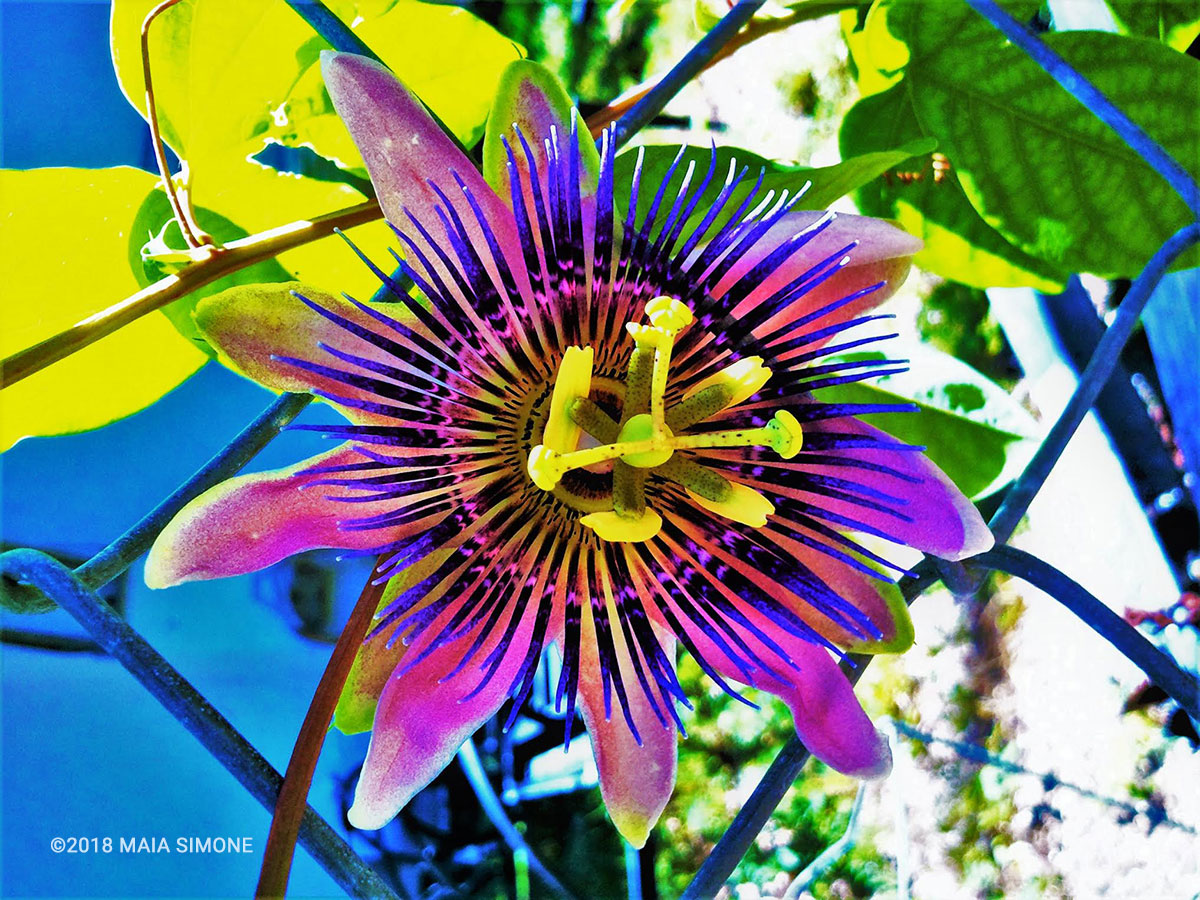
Fast forward five years later, and I lost my career (and with it my healthcare), my longtime relationship, most of those loyal friendships, and the majority of my muscle mass. Everything I had worked so hard for, had vanished. The majority of my days were spent bedridden, with too much brain inflammation and intense flu-like symptoms to notice the passage of time. But I knew, however slowly or quickly it moved, I didn’t have much of it left. And so, gathering all the strength I could muster, I sold everything I owned. I moved to a place of glassy water and palm trees and deep mangrove swamp. I moved to the Everglades.
It is hard to explain my decision. Maybe I was just too ill to think clearly, and that’s how I ended up here. But my plan was to be in a place of warm weather and intense sun, among lots of wildlife and natural things. I chose to spend what days I had left enjoying the sunset over the water, and growing most of my own food and medicine in a real yard, in a small town just on the southern outskirts of the enormous preserve. All of this felt like such a luxury, after a grueling schedule amid cold concrete, endless winter darkness, and absolutely zero privacy. I had had everything I wanted, but it came at a price. A terrible, cruel price. To live in that world, I had to give up my health, and with it, all the things that I cared about. Now, I could do whatever I wanted. I had nothing holding me back anymore. Part of it was sad, but part of it was just enormously freeing. I stopped worrying about debt, about expectations, about pleasing society. None of that had worked for me. It didn’t keep me from getting sick. It didn’t keep me from being alone. So, I left everything I knew behind.
It came as a bit of a shock, then, when I did not in fact die. Instead, toiling under the feverish sun and swarms of mosquitoes in gray clouds against the sky, I flourished. I worked hard to study old resources and learn the ways of ancient local plant medicine, in as much as I could find. I grew a garden of endangered plants native to the area. I gave myself to the rhythms of nature.
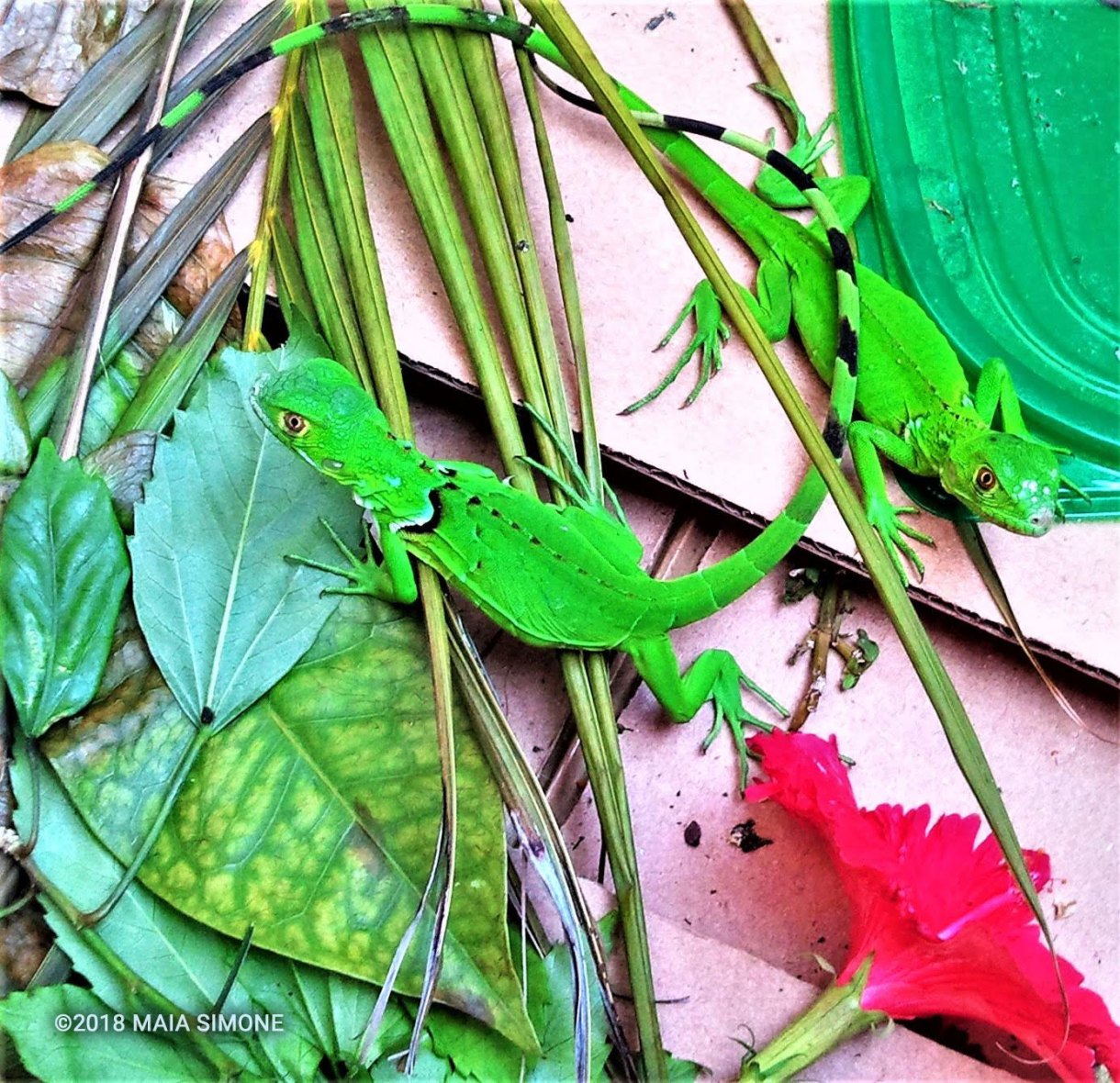
As I worked, I watched the wildlife around me going through their own ups and downs, and frequently stopping near to peer at me curiously. My backyard has an enormous crocodile that sits and suns himself with jaws wide open, feeling the heat of yellow afternoon on the rough recesses of his tongue. There are barracuda and crabs that I can see from my small saltwater dock, huge silvery tarpon, slow gray manatees, and a gigantic old lobster that lives underneath a few sunken wooden slats where the dock caved in after a hurricane. There are nurse sharks, and peregrine falcons, and black cormorants, and iguanas, and scorpions galore. And yes, there are a few invasive pythons too. I eat flower salad on the daily (made entirely of edible flowers), with fresh coconut or lime or banana or tropical cherries I planted myself in the yard. I eat many plants that have no English names, but are full of bitterness and vitality.
My body has responded well to this climate. I’ve regained some muscle, and lowered the inflammation a bit. My immune system seems to have stabilized, and is not actively attacking my organs anymore. But, I am not cured. And, living in this remote part of the world, I am intensely lonely. But for the blessed high-speed internet that has recently been piped through, I would never see representations of any people I relate to. There are lots of birds and fish to talk to, and a few old timers in town with whom I have absolutely nothing in common and don’t feel particularly comfortable being out to. Once in a while, I miss the wild parties and endless happenings of the rich bi and lesbian community from whence I came. I very much miss the diversity of skin colors and hair styles and perspectives. And on a very quiet, dark and mosquito-filled night, dare I even say I miss some of the drama? …Well, maybe I wouldn’t go that far!
I suppose I could sell this place and leave here for something akin to my old life, but I am not well enough to sustain a relationship, or a normal job. And what if going back intensifies my illness again? How could I leave my plants?? I’ve planted over 300 species of them. They help me to thrive. In my dreams, I find a woman who isn’t bothered by the illness, who wants to come live in this luxurious wilderness with me. We lie in side-by-side hammocks holding hands, whispering to each other while we watch the shooting stars that mark nearly every night. Sometimes, instead, I dream that I get better, that I get cured –that I can have a strong career again, and have a family, and travel all over the world together. In reality, there is nobody here but me and the crabs, and the lizards with their quizzical stares. When a shooting star passes, there is no one beside me to nudge, no one with whom to make a wish. This incredibly beautiful place, but I must love all on my own.
![]()
Every year on my birthday, in my old life, I would call my friends and we would traipse through the city streets to an eclectic restaurant. Then we would watch a movie outside in the park under the forever-orange sky. Sometimes we would hit up a lesbian-friendly sex shop late at night before heading home, holding up dildos and dental dams and whips and making stupid jokes – the kind of jokes you make when you know your friends get you, and love you no matter who you are. But here, in the stillness that is ever moving, it’s like that life never existed. It feels like it happened to somebody else. Now, because of my disability, I have to use a walker or a cane, and I am always on the brink of utter exhaustion. I can’t get very far from home. Where once I traveled the world, and always had people around me, now I can’t walk more than 100 feet without burning out. I go months sometimes without seeing another person, much less a gay one.
The only time I can find a semblance of normalcy is when I am lying down, so my heart can better regulate itself. This lends itself well to swimming, when I can get out to non-crocodile-infested waters. I’ve also found that kayaking is almost like normal life to me, because I can move and see the world while lying nearly completely flat. Sometimes, I even take my feet out, and put them on top of the deck, so they’re above my head while I paddle. It’s like lying in a hammock while you sail across the waves – and on a good day, I sometimes feel as if I could go forever. Here in the Everglades, living down by the edge of the ocean, I celebrated my birthday by climbing into a kayak and setting off into the salt water for parts unknown, on my own.
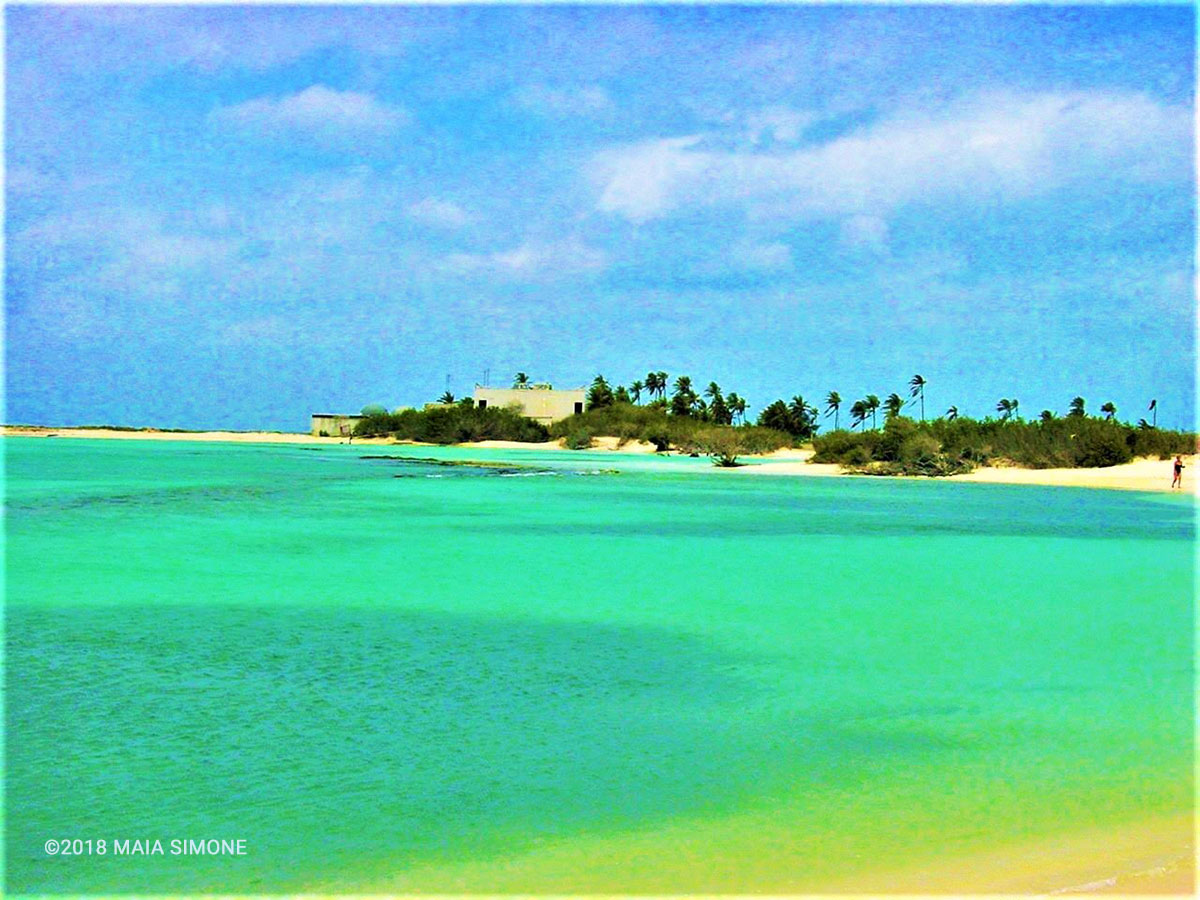
You’re supposed to give someone your float plan before you leave, so if something happens, you can be rescued. I did take the time to tell my neighbor I was leaving, but I admit that the direction I told him I was heading, is not where I ended up going. It took me so long to pack everything – emergency gear, medical supplies, extra water, tarping… by the time I left, I was several hours late and feeling impatient. Being outdoors when you have a chronic illness has a lot of extra dangers to it, and requires way more gear and planning. Especially when you are going alone, and are prone to bouts of inflammation-induced dementia. But just because I’ve become sick, that does not mean I’ve magically grown more patience in my life! I am just the same person I was at the height of health – but maybe a bit more limited. Some days, you just don’t want to be limited anymore! So, when I looked at my map and realized I could reach an island in the other direction that I’d been wanting to see for years, and still get back to my original plan if I paddled extra fast, I decided to go for it. After all, every day that I wake up is a risk. I never even expected to make it this far. Every new thing I try, every place I see, is a bonus. And birthdays are made for adventure, and reaching new milestones! Ah, brain inflammation makes you make stupid decisions…
It was well into the rainy season, but the forecast was clear, and the last few days had been perfect. When I pushed off, the sky was intense blue, and the water was glassy and flat. Here and there a cloud floated, and when I dipped my paddle into its reflection, the whole world melted into one infinite expanse of horizon, white and blue and endlessness of light.
I picked up speed, my hull cutting through the water effortlessly, and pelicans came along with me, flying low beside me into the breeze with big eyes and fat brown bodies. They were so close I could see their downy feathers ruffle, their flipper feet tucked underneath. I wished I could soar like that. I passed a crossing of deep water, where very fast boats speed through. I had to paddle very fast – reckless boaters will hit me before they see me, as they race through at alarming speeds, or capsize me just with their wake. I am so low to the water’s surface, I try to extend my paddle as high as I can on each swing, so they can see me better. My kayak, and my life vest, are all decked with bright colors to help with the visibility. I was lucky: there was a brief lull in traffic. At last I crossed, and the noise of boats and people, and the danger they come with, faded into the distance. I slipped through the flat water like I was made for this.
Flying fish are common here, and as I paddled, their scaly white bodies would flail into the sun in front of me, blinding me with the glint off their sleek wetness. I got enough of a current trail going behind me that a dolphin followed me, and I had to keep turning around to catch its dorsal fin rising up and down in the wave behind me. I was digging all out into the clear water, paddling with all my might to reach my island destination. I didn’t care how intensely my arms were burning from the effort – I felt like I was flying. I felt like I was alive. Wind whipped at my face, and salt water splashed in my hair.
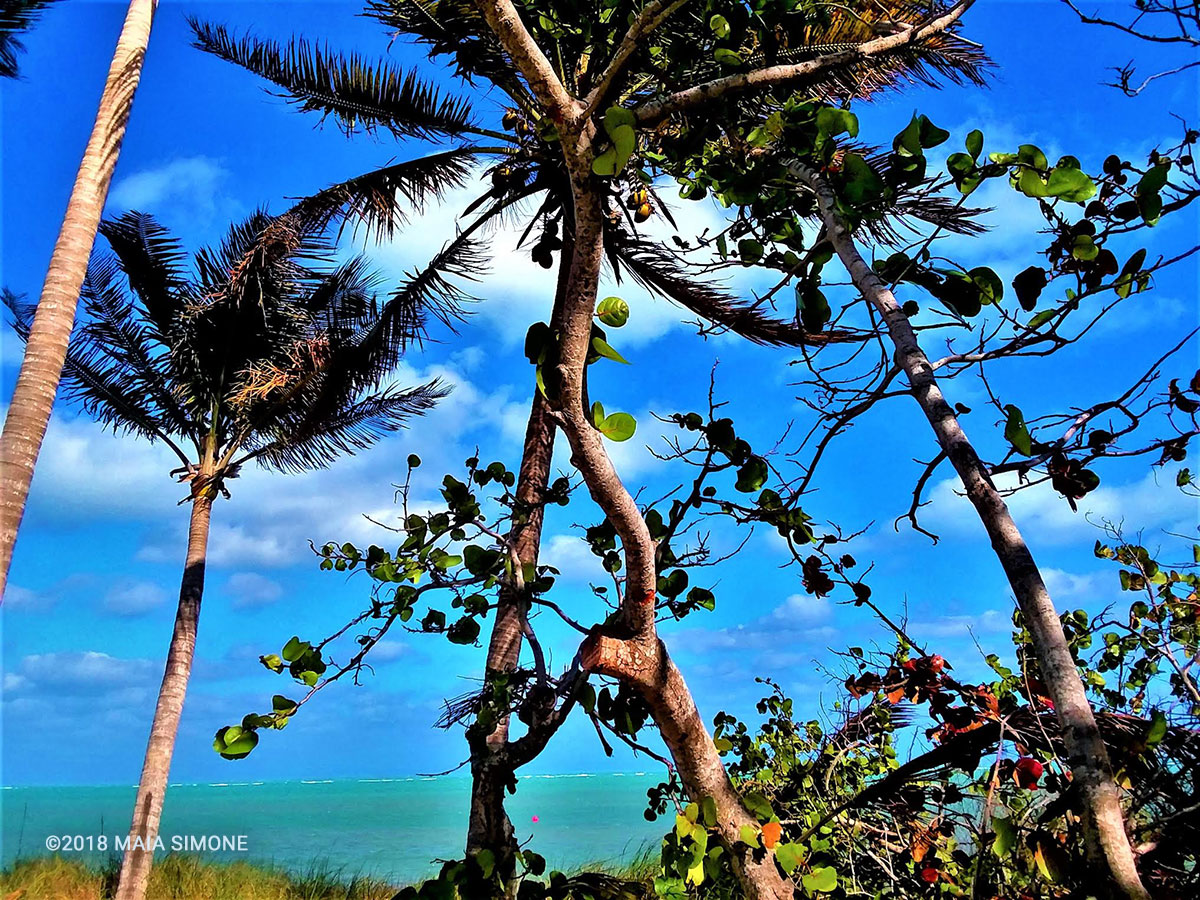
I passed the first mangrove island and slowed down. Anhingas were parked on the edge in the branches, their graceful s-shaped bodies shimmering black in the sun’s rays. They were nesting. There are strict rules in the park about how close you can get to land, so I let the current take me past, in utter silence so I could hear their weird croaking calls and not disturb their happy family afternoon. Before this first island, the water was nearly black with seagrass growing in abundance. All the beautiful living creatures like to have their babies among these grasses. They are essential to life here. The grass is protected. You can incur enormous fines if you drop anchor or ground yourself and damage any of it. Although the water is crystal clear, the grass gives this area of the Gulf of Mexico between islands a murky, green lagoon-like appearance. As I careened past the first island, suddenly the view opened up, and before me was an endless expanse of glorious turquoise ocean. The sea rose and fell, up and down in little points jostling against each other a mile in front of me, sparkling in the intense sun and calling to me to keep going. I felt invincible. And so, I plunged my paddle into its glistening depths with a vengeance.
I pulled out into the swirling blue. The water here is deeper, but still not too deep – about 10-12 feet in what is now high tide. If I pause, I can see straight to the white sandy bottom. Below me are yellow-striped juvenile grunts circling loggerhead sponges like big golden doughnuts. Straining every muscle, I drag through the swift current, thankful I grabbed this 14ft kayak off the local marine swap website just a month earlier. It had cost almost nothing because it had a few broken odds and ends and a weird multi-color paint job. The owner was in a hurry to unload it. But in its heyday, it had been a sophisticated design, and could cut through even considerable sea waves at a surprising clip without much risk of capsizing. In only an hour I passed island after island, charting a careful course on my map, as they all look exactly the same. I would have to be extremely careful to leave exactly the same way I came on my way back. Each stretch of mangroves was perfectly flat, with errant branches reaching up into the sky, like outstretched green arms clawing at the clouds. All the branches appeared dusky white from crusted salt spray. Finally, I turned a sharp bend cautiously, and made my way deeper into the Preserve toward my destination island, which lay straight ahead of me.
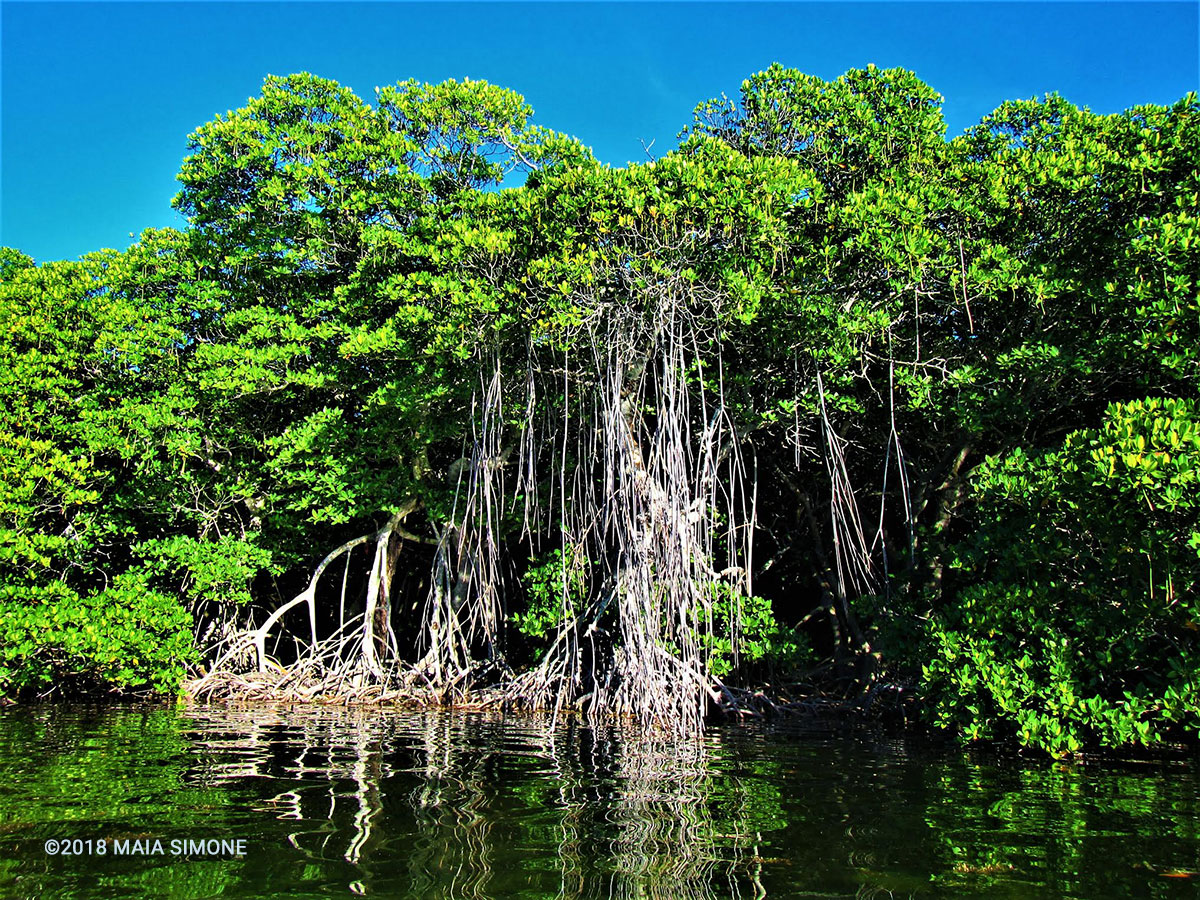
I don’t know why I had expected something more exotic. But this island was indistinguishable from all the others. This location had multiple names, but like several islands in the area (which is of no help to new navigators whatsoever), it was called “Shell Island” by locals. I knew it was near an area known for great birding and stellar professional nature photography by the few intrepid enough to come out this way in the dry season. I would have to hold off on my plans to bring a better camera out here, but I was eager to scope out the terrain for my future trips. As I drifted up near it, there was a gorgeous stretch of neon turquoise water, and an enclosed area protected from the current. In each direction I looked, all I saw was sky, water, and craggy green mangrove islands. Maybe there were conch shells around here, but the water had reached high tide, and Shell Island no longer had any beach, much less any visible shells to speak of. I leaned backward over the kayak, with my feet on the deck, to watch the world upside down. I do this sometimes, forming an arch over the cockpit of the boat and balancing myself against the waves, so I can see the sky below me and the water above. I’m sure to others this would make me look insane, but the great thing about being out here, is there are no others. I never have to feel embarrassed, to look a certain way to please others with my female form, or even worry about the extreme frizziness of my hair. I don’t have to be straight, or gay, or female, or male, or more able-bodied, or less able-bodied. I am simply me, existing in a frozen moment of time with all the living world drifting and breathing and existing around me. And the animals, who out here have rarely seen human or kayak, look at me as nothing more curious than a huge colorful fish passing through.
I was so busy enjoying the look of waves over clouds, that before I had realized it, the kayak drifted serenely into a bank of mangroves. Whoops. I am not supposed to be this close. I sat down in the kayak and looked up. Roots like deep fingers drove beneath the surface and clung into the sand below. Shrimp hid in the recesses beneath, their antenna and spiny legs pointing out and barely visible through the crystal water, and barnacles clung in purple masses just at the surface. As my eyes scanned upwards, they came face to face with a green heron, perched among the green leaves just a few feet from my eyeballs. It watched me calmly. I did not move, nor dare to barely breathe, and so it leaned down and scratched its leg with its beak, and shook its feathers. That is the bird version of a dismissive yawn.
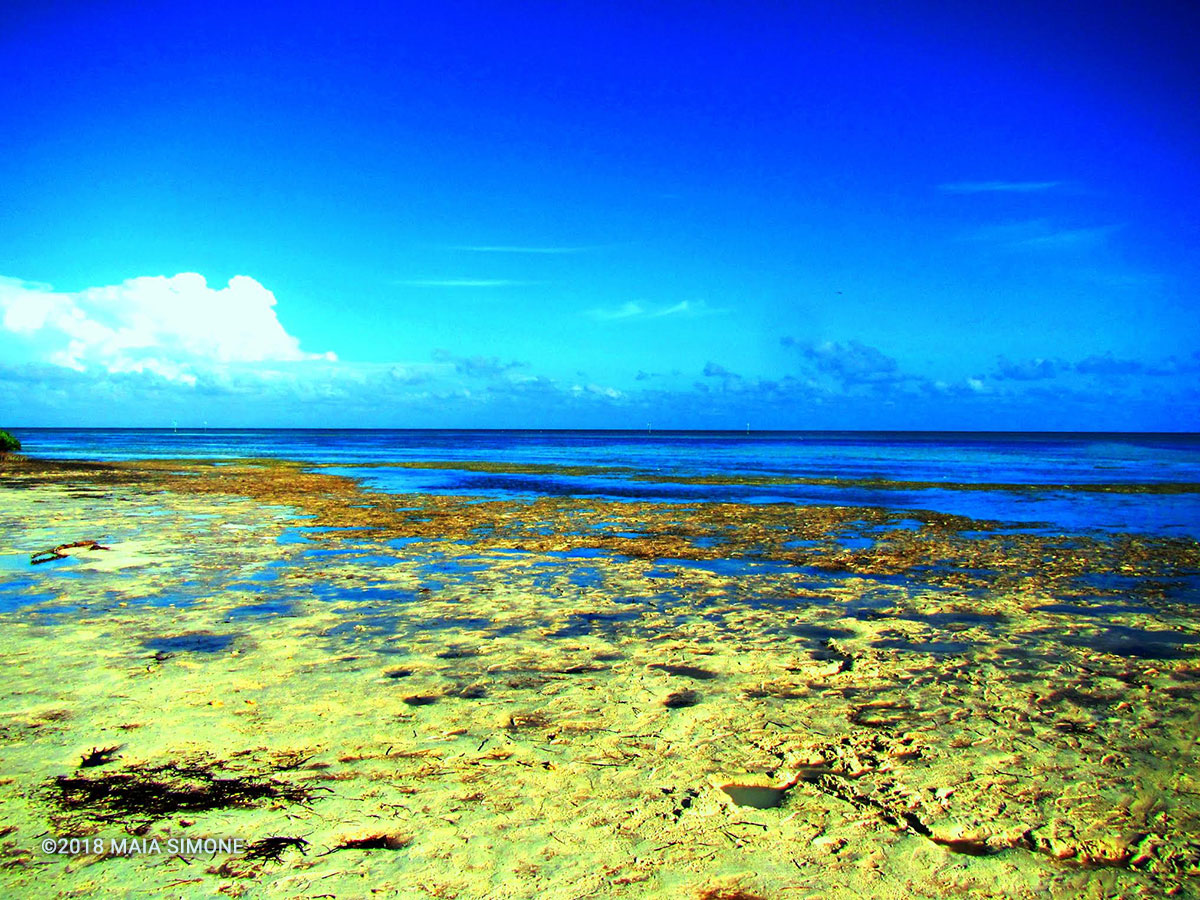
I stuck my paddle in very carefully, without making a sound or a ripple, and painstakingly pushed backward, slowly enough that I could slide off without disturbing anything. Something shiny and black whizzed past my head. Oh. Horseflies. I really hope they don’t bite me. Strange to see flies out here, so far from land and just on the periphery of the wideness of ocean. Other than the birds, who aren’t all that big or meaty, there is nothing for them to feed off. I tried not to make any sudden movements, as another nearly hit me in my eye. I realized too, gnats were eating my legs. Such a difference of life when you pull up close to these islands, instead of being a few hundred feet offshore as federal law dictates you’re supposed to be. There was a smell of rotting seaweed, bird nests covered in droppings, and fresh saltwater air.
At last I drifted back to the requisite number of feet between the islands, and set down my danforth anchor. There was nothing for it to catch on out here, but my hope was the kayak was light enough that simply dragging into the sand would be heavy enough to hold me. I looked around and realized, I was many miles from any other human beings. I could not see the land of civilization. I could not see even signal towers with lights at their tops, or channel markers, or any other sign that humans had ever wandered the Earth. I could scream, and even with water carrying sound as well as it does, no one would hear me. I had passed the last boats more than an hour ago, and the only sound around me was the distinct faint whistle of wind through mangrove branches. And an occasional splash of fish, like punctuation to mark the separation of hours.
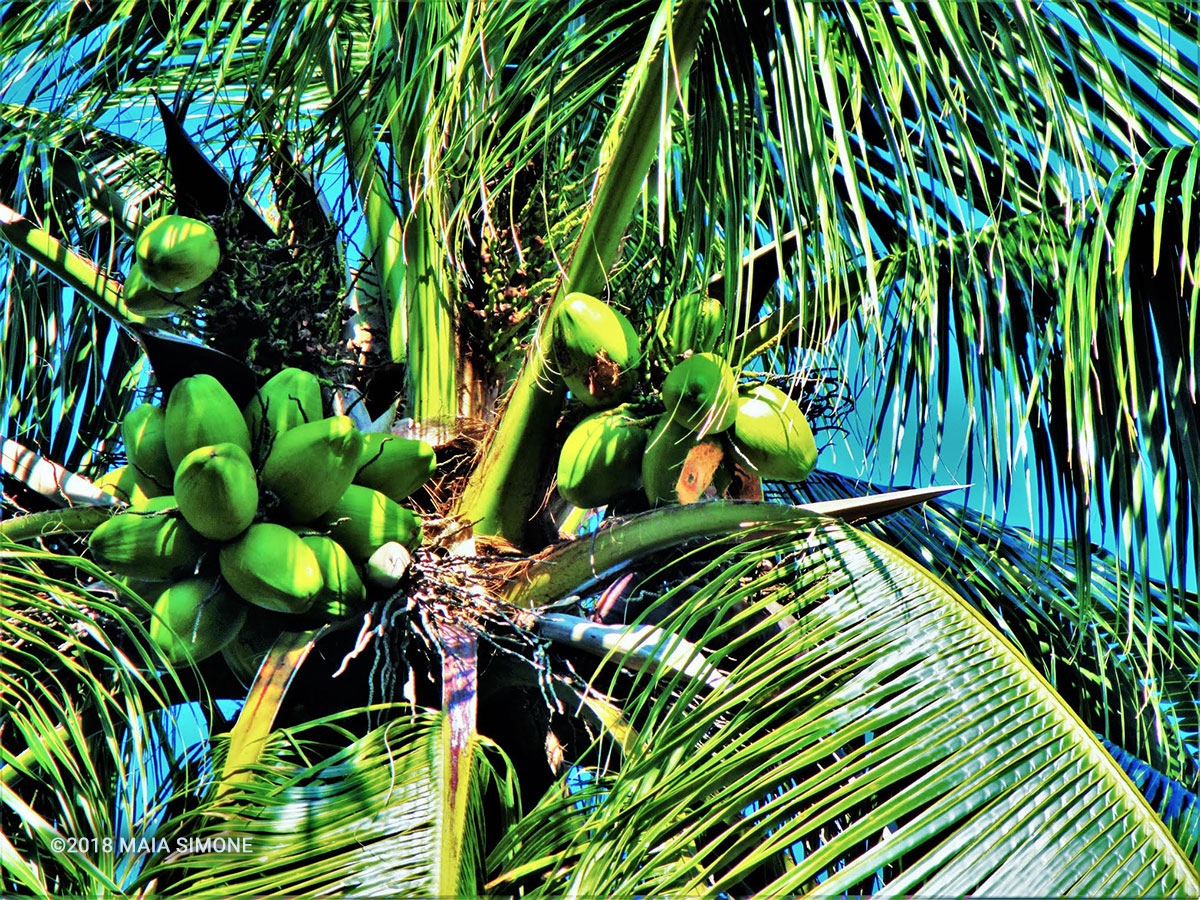
Hundreds of years ago, Calusa, Tequesta, Matecumbe, Jega, and Ais peoples lived in this region and migrated up and down the coast according to the weather. The Calusa, the dominant force known as the ‘Shell people,’ lived in open-air stilt houses over the water, beneath roofs of thatched palm. They collected shells for tools and jewelry, and when they were done would discard them into large shell mounds that marked centers of communities, like leaving behind an ecological town dump full of clues to their daily life. Perhaps Shell Island (one of many Shell Islands in the area) was once such a center, if a very small one. The Calusa, who knew exactly how to survive and make the best of this beautiful area, would not have spent much time here in the blazing heat and torrents of rain and bugs that frequented at this time of year.
For now, maybe I am the only person to be out this way for years, and maybe only a handful have ever been here in this unpopular season since the dawn of time. The Calusa, and their neighbors, were killed by a mix of other Native American tribes, foreign diseases, and various Europeans. Those that survived were driven out of the region, forced to board canoes bound for Cuba. When they moved out, a mix of tribes from the Southern United States, and maroons (African-Americans who had escaped enslavement), moved in. All were escaping the colonizing forces and ensuing genocide from first Spanish, and then the United States. They became known as the Seminole, or ‘wild/runaway people.’ They were willing to risk the heat and mosquitoes and hurricanes and crocodiles to live year-round in the harsh climate of the Everglades, as the only way to preserve their lives – and it is because of this that today, some 2,000 of their descendents remain in the reservations of the Everglades. The white people who intended to enslave and kill them, were unwilling to trek deep into the mangroves after them. The strongest – or perhaps it is simply those who are most desperate to do whatever it takes to keep living – survive, born of pure necessity. Here on the outskirts, I hear only the wind, and the rush of water beneath me. I wonder what it would take to survive out here, if I had to do it all alone. Community, after all, is everything.
I want to be the intrepid one, to ignore that I am sick. I hate spending most of my life looking at the four white walls of my bedroom, alternating only with digging holes in the solid coral rock of my yard for my new plants. So, despite how exhausted I am already, how my head is throbbing and my throat is swelling up in pain (a clear sign that my immune system is not very happy), and all the other very good reasons to the contrary, I grab my snorkel. I pull on my dive boots and gloves, just in case there are sting rays or barracuda or sharks or sharp coral or whatever random thing I might come across that could accidentally lead to a very unfortunate mishap. I think – ‘you know, I really should get a marine radio. I don’t know if it would reach anybody out here. But… just in case.’ I pull out my dive knife and first aid kit so they are easily handy if I need them. And then thunder cracks behind me, and I look up and there is a massive black cloud a few miles away that came up out of nowhere. Crap. But I am blazing hot, and the water bottle that now contains nearly boiling water is not cooling me off. I should have packed more ice packs for my head in case I had a flare up. Storm or no storm, I reached over and installed my dive flag high above the deck. I slid off the edge of the kayak, down the knotted rope I’d affixed to the end (trying desperately not to tip the whole boat over), and plunged in for a swim.
God this water felt good! Nervously, I circled the kayak a few times, dove under it, scoped out my surroundings. No sharks that I could see. Good visibility, though the suddenly increasing current was kicking up more bottom dust than usual. Hmmm. There actually wasn’t much living out here in the middle of the sand at all. I picked up a few whelks, looking deep into their spiral coils as their flat feet extended toward me, and set them down. I laughed to myself about the local joke with conchs and similar shells, it was as close as I’d get to female-looking anatomy outside of my own for a while! And sure enough, there was a shield made of shell, pushing out toward me, denying entry. “She only welcomes you when she isn’t home” they say… the shell has to be empty to see inside, or to use it. I think how I can only meet other women if I’m not home, if I give this up. And I want a family. But I love this place. It has seeped inside my cells now. It is healing me.
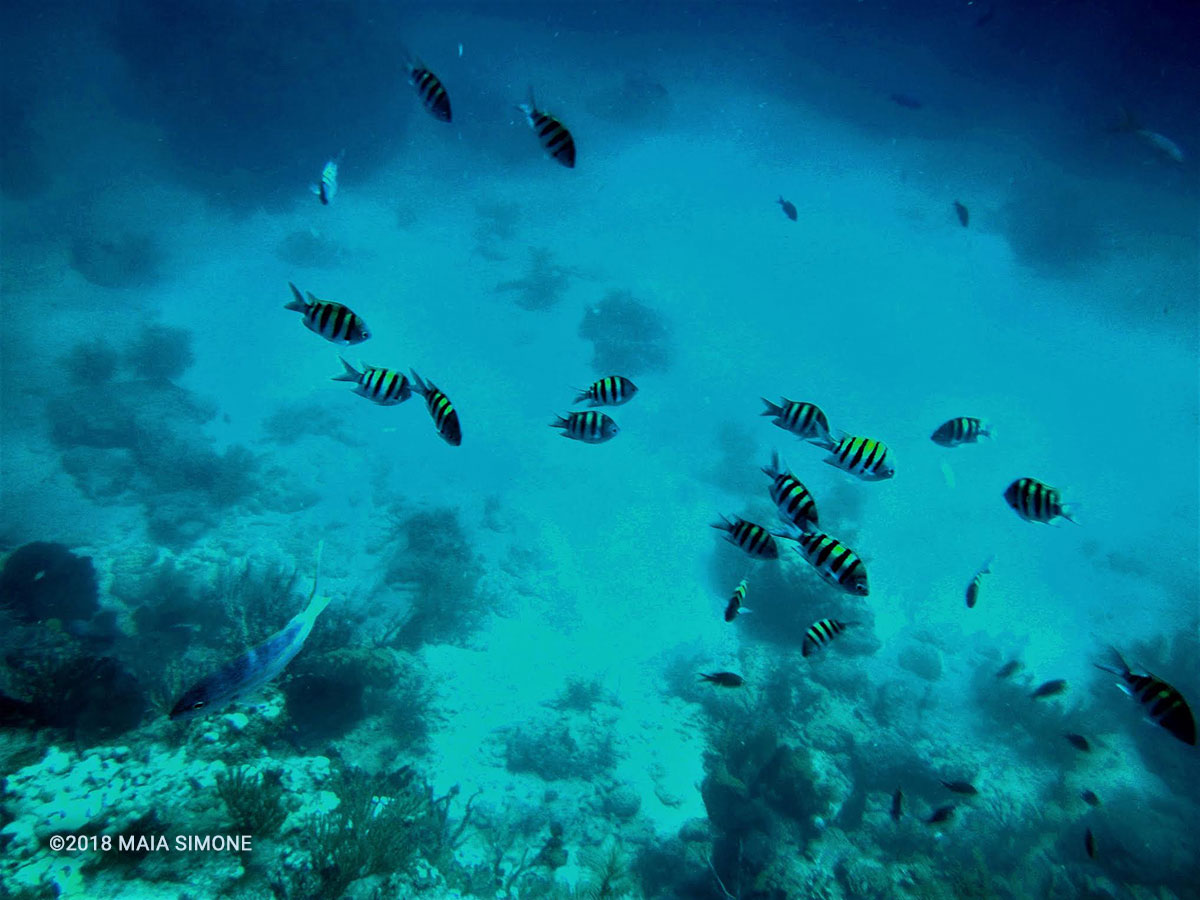
I swim for a while, doing corkscrews, handstands in the middle of nothing, just feeling the warm current slide past every inch of skin. It is so good to move again, to feel weightless for a minute. To feel almost normal. I float on my back and watch the clouds slide by on humid trails, shifting and changing as white vapors pass each other. Higher wind pushing one way, lower pushing another. The kayak rocks in the gentle waves, and the sun is changing color to a deeper yellow. A school of sardine-size fish suddenly shoot out of the water into the air, aim right toward me, then crash back into the water maybe 5 feet ahead. I look quickly behind them, knowing what this usually means is coming, and see a dorsal fin pointed straight upwards about 25 feet away. Uh oh. Shark.
And not the tame nurse shark kind of shark. A shark that some 200 fish are absolutely terrified of. Lemon shark? Bullshark? Blacktip? In half a second, I raced through a collection of images I had in my head, trying to match the fin with a fish I could identify –my mind went blank. Oh god, where did it go? I had cut my finger getting out of the boat. It was a small cut, but still I shouldn’t play around. I made a mental note that I was very glad my period ended a few days prior. Sharks do NOT typically just attack a human being for no reason (nor do American crocodiles, barracuda, scorpions, or most other wildlife found here for that matter.) But, if one is chasing a school of fish, and water is swirling and cloudy and one of my limbs happens to get in the way… I don’t want to be way out here by myself dealing with the aftermath. I swam for the end of the kayak and hoisted myself up. My arms were a lot more sore and fatigued than I had realized. It took a couple of tries to get on. Scrambling, I cursed myself for not having strapped my dive knife in its sheath to my side – I could have used the blunt end to hit the shark in the gills or the eyes if it came too close.
Finally out of the water, I dragged myself ungracefully up the deck of the kayak, nearly falling off and capsizing in my haste to get all 4 limbs back inside the cockpit. Horseflies were dive bombing my wet legs and arms. I felt scalding stings that I then realized were giant mosquitoes attacking my quickly-drying skin in the heat, swarming around my head, and trying to get in my ears. There are 43 different species of mosquitoes in the Everglades (you heard me – 43!), but I recognized the feel of this species instantly. They have a saliva that feels like acid running through my veins as soon as it is injected. The humidity intensified dramatically. I stopped for a moment to slide down and lay inside the boat, clutching in pain at the bites. The vinegar I use to neutralize stings – sea creature and airborne alike – was tucked away in a far corner of the kayak. I would have to go back out on the deck to get it, and risk my new pal the shark. Not happening. I also now realized I needed food, and a round of medicine. But I only managed to pop one pill and get a chunk of a protein bar into my mouth before I felt drops on my face, and sensed a darkness that was quickly enveloping the whole world. The wind had changed direction. The black cloud was now edging closer overhead. I really did not have time.
I threw my life vest back on, strapped it tight, pulled up anchor, and ignoring all exhaustion of limbs I felt, pushed the water with my paddle as fast as I could go. I tried to glance at my waterproof map as I went, to make sure I headed back exactly the same way I came, but the droplets started to come down faster and blurred my vision of everything. I surveyed the area around me. The colors were much darker, the shapes much less distinct. If I could head back this way quickly, I might be able to get past the storm, because it looked like we were heading in opposite directions from each other. I took a shot.
Paddling as hard as my muscles could manage, I dug in deeper and deeper, trying to push against the now very strong current. As the wind whipped up, I heard a screech overhead. Claws and wings and gray darkness blocked my vision, and I ducked my head and threw my arms up over it. In all my noise and haste, I must have upset a nearby hawk who was sitting on its nest. Its talon caught a strand of my hair, which promptly yanked out, and its wing brushed my arm. I sunk back down in the boat opening again. What the…? I was drifting backwards fast. But I needed to check myself over – did I still have all my limbs intact? Where my eyeballs still in place?
Mercifully, the answer was yes. That could have ended very, very badly. Just as quickly as it had swooped down on me, it had gone. I guess it was just a warning cry. Noted. This is a wild place, and I am trespassing. Believe me, I am trying to get out of your way as soon as possible! “Sorry!” I called out behind me. “Please don’t claw me to death. I’m going!”
The strength of the hawk’s wings, how they can beat against strong winds for hours, sometimes for hundreds of miles without rest, made me feel a moment of awe. I wished I had that strength, that sense of belonging in the world. That sense of being exactly in the right place and the right time for who you are, with all the others who are just like you. I have never felt that, even in my best times. I certainly don’t feel it now. I feel a million miles away from anything that makes any sense, from any impression of belonging or stability. I am drifting, waiting to see where the current takes me. Hoping I will find a place and a time that feels like home.
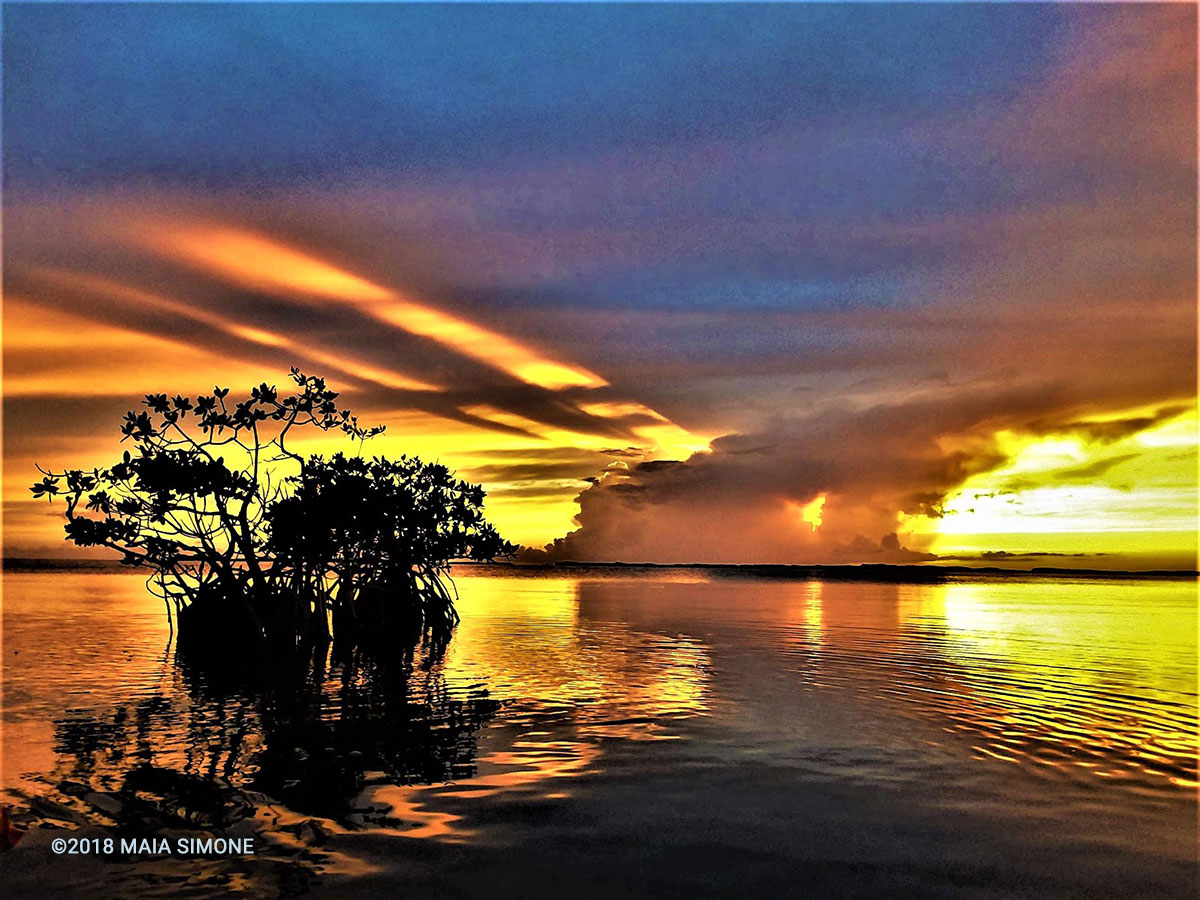
The light had a strange deep yellow quality, that eeriness that on land in faraway places, I have come to associate with the minutes before a tornado touches down. There are tornadoes on water – they’re called waterspouts, and they are deadly for small watercraft. The air felt weird and heavy, but I didn’t see any swirls extending into the sky. Soon I got into a rhythm that sucked nearly all the oxygen out of my lungs and limbs, but kept me moving forward. The sky grew darker and darker, and the rain got heavier and heavier. I passed island after island, clawed hands of mangrove reaching desperately into sheets of rain, birds’ nests of seaweed and twigs getting whipped by the wind. 1, 2, 3, 4…I counted each island as I moved past, and I thought I knew where I was. But did I? Even in the best of conditions, they all looked the same. Now I could barely even see them at all. The waves started to get very high, sloshing over into the boat again and again. I did have a bailer, and I had emergency float rolls to keep the kayak from sinking. But if I stopped to bail, I would spin backwards into the abyss, and lose all the ground I’d covered.
I reached a large clearing, where the water got deep, and there were no islands for about a mile. I thought I remembered this. But how could I be sure? Instead of being brilliant, almost glowing turquoise, and clear – it was dark gray, and completely opaque. I couldn’t look for specific large sponges on the sea bottom to mark my path. I could not see any island in front of or behind me, just water that was half fresh, half salt, streaming into my eyes so hard while I gasped for breath. I couldn’t tell if I was crying, or just panicking and really wet. The water started to churn and spin, throwing itself into the boat at an alarming rate. I started to wonder if I was sinking. I couldn’t see if my float lines had snapped off. I felt dizzy. I suddenly realized, I had gotten caught in some vortex. I was spinning.
For those who have seen it, it was remarkably like the real-life version of the Disney cartoon The Little Mermaid, when the sea becomes a black cauldron stirred by Ursula. I would not exactly have been surprised to see the Sea Witch rise up before me in her BDSM gear and glowing yellow eyes, cackling with glee. But I was no Ariel. I could not breathe underwater. Even my snorkel would be no match for this. The kayak spun around and around in hellish darkness, 14 whole feet that I could not keep straight or move in any direction forward. I couldn’t see anything. I tried to stick my paddle into the water to at least hold the boat still and prevent it from being dragged so fast. In one fast movement, the current yanked the flat side of the paddle, and snapped the cheap plastic in half.
Oh. Shit.
I never saw the other half of my paddle again. Only dark roiling water, three-to-four foot waves in a region that rarely sees more than 6 inches, and black black black sky. Thunder cracked so loud over my head it shook my skull. Lighting blazed through the sky sideways, straight down, and in wide forked branches. It was very, very close. I realized, I was not going to get back home in this. My only chance at survival was to stop. I took the half paddle, with its hanging leash and jagged edge swinging past my face, and dug in. I pushed as hard as I could on each side, toward a shadow space that either was an island, or deeper into the Gulf of Mexico and possible death. I took my chances.
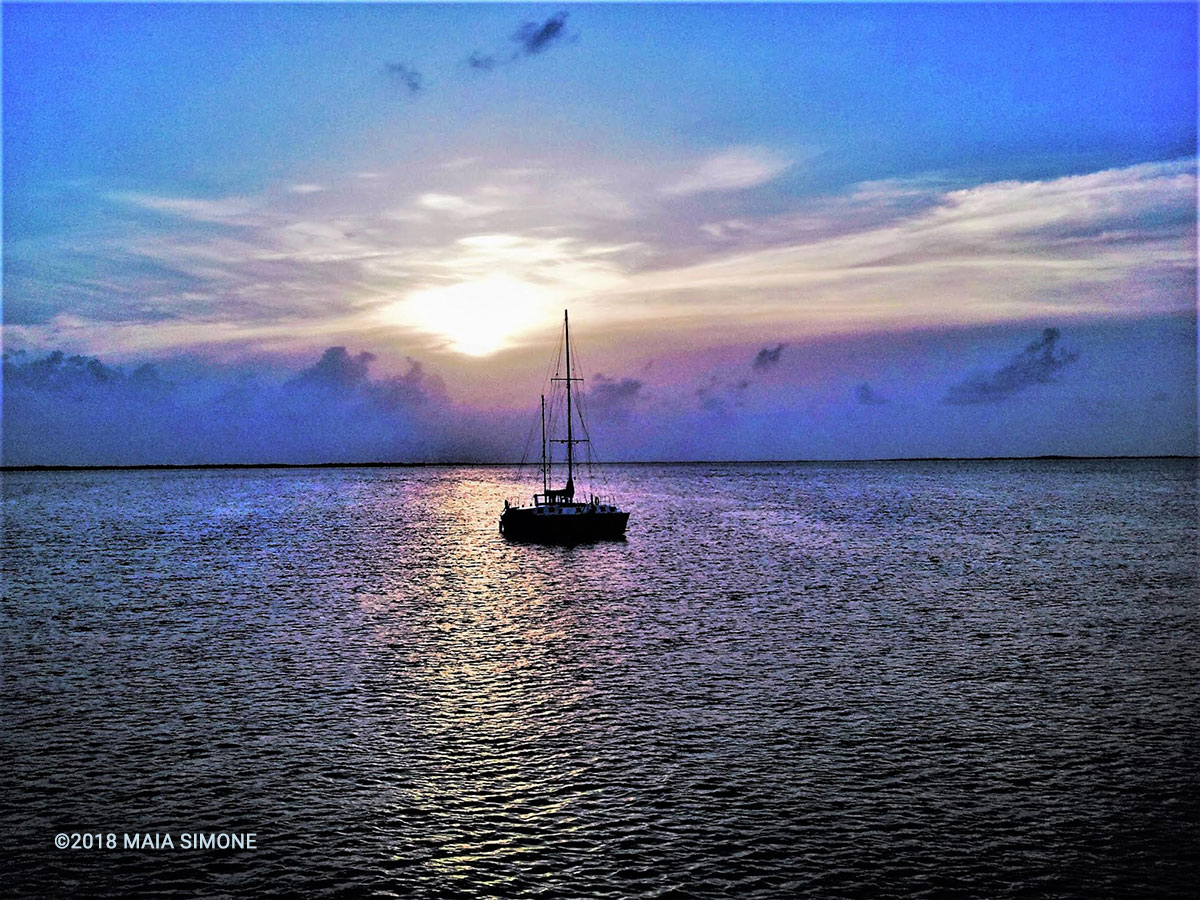
After about 15 minutes, I finally came upon an island, and law or no law, I dragged myself up against the mangrove branches and clung on for dear life. The kayak was full of water, weighed down to the point of nearly being submerged. It kept pulling beneath me, I had to brace my legs against its walls and strain my abdominal muscles against hundreds of pounds of pressure, to keep it from being sucked down and carried away. I threw down the anchor, but it couldn’t grab hold of anything with the water being shoved around so violently. I could not reach my emergency rope to tie me to the trees. I just clung with all my might, with every last shred of energy I had left, to a branch while the current rubbed me back and forth on it, scraping my arms and fingers raw.
This storm was nowhere in the forecast. Was it an unexpected hurricane? This was by far the worst squall I had seen all year. It occurred to me that I had turned around so many times in the spout, I wasn’t sure where I was, or which direction I was facing. I did not know what time it was, and I did not want to turn on my phone because it was imperative now that I save the battery at all costs. I had a waterproof compass on my life vest, but it wasn’t super reliable. I started to wonder if it was possible to drown with your head above water, so much rain was being poured down my throat and nose. For a while, I just held tight to the mangrove branch and kept my eyes shut. I tried to press my face into my arm so I could breathe. I couldn’t differentiate sound anymore, there was so much water in my ears, but I could feel the claps of thunder shake me over and over. The kayak rammed me forward into the branches, twisting my back and rattling my bones. Eventually it was so dark, I wondered if I had reached nightfall.
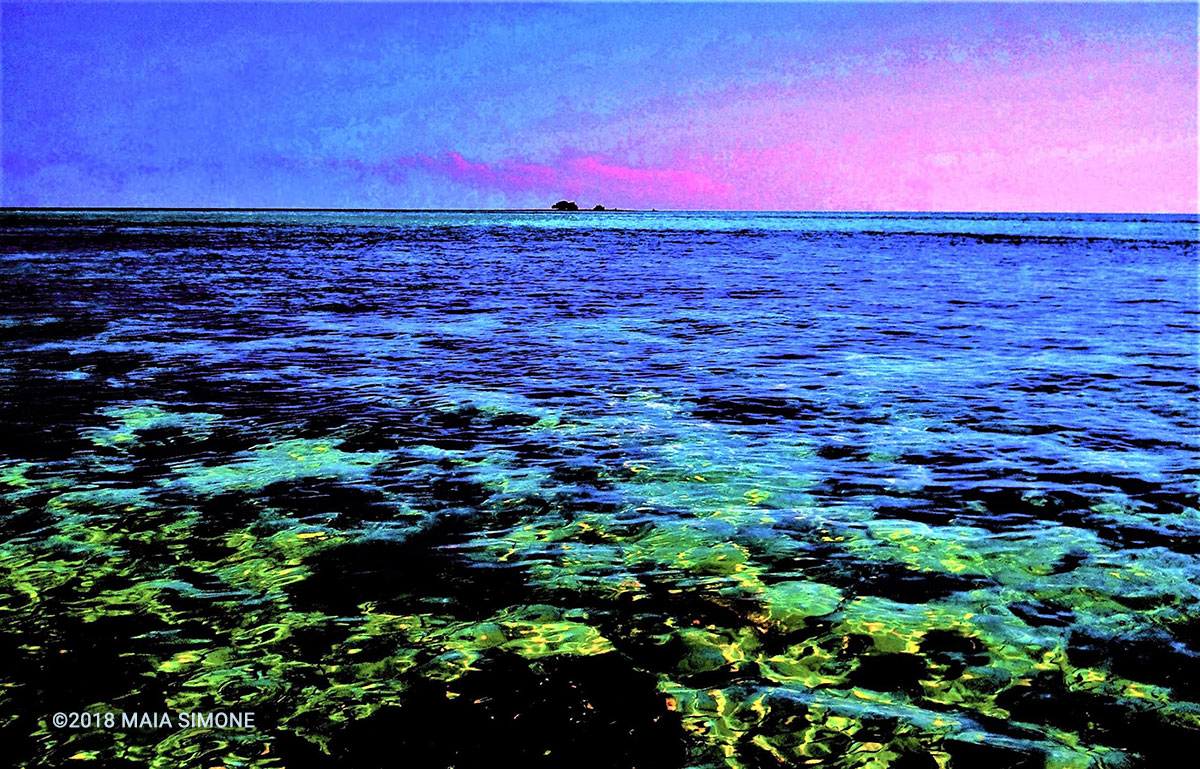
It slowly dawned upon me: I was confused, and very, very sick. I was also freezing. I didn’t ever think I could feel cold out here. After what had become hours of rain torrents and wind and no food, and not enough time to drink water or take my medications… the chill of death felt like it was upon me.
Knowing I was so far from my plan, and from anywhere that people normally went, in such a very tiny vessel shoved against the rocks in the rain, it was unlikely anyone would be able to find me if they were searching. It was far too dangerous for anyone to go after me now, anyway. If the rain could just slow up, I could get out and tie myself up to the trees properly, cover the kayak with my tarp which I would also tie down, lay safely inside and go to sleep. If my body could hold out, I knew I could survive all night out here. I had all the gear I needed. And maybe after some rest, I could remember what medicine to take, where exactly I was, and how to get out of this. My brain inflammation was terrible; all I could remember was feeling very confused. The rain slowed, I looked down into the water and remembered how it had looked like the sky. I wondered which was which. Maybe I was drowning. Maybe I was underwater and that’s why it was so hard to breathe, and if I just pushed my head toward that surface and took a big inhale, I would find oxygen again. Maybe everything would be better. I moved toward the water, or toward the sky, and dipped my head low. And then I lost consciousness…
![]()
When I came to, the sun was setting. It was still raining. As often happens here, one side of the sky was black and thick with rain, and the other was a blaze of orange. There were two rainbows in the distance between them. And I thought, but wasn’t sure, that I saw tiny a blinking red light. Was that a communications tower? I shook my head for a moment, trying to quell the intense pressure of brain pressing against skull. Think. What did I need? I had to move fast, before it gets dark. I think I can make it.
My hands were shaking. I was covered in sweat. I sifted through pill bottles, being as careful not to drop any of them into the water. I took some heart medication, and a few things to ease the inflammation in my brain. I also scarfed down the rest of my protein bar and some glucose powder that could get energy into my cells quickly. I extricated myself from where I was rammed amidst the branches, pulled up the useless anchor. Past all the lactic acid buildup and screaming in my muscles to stop and never ever move again for the rest of my life, I pushed off with my pitiful one-sided paddle, trying my best to go straight and make progress forward.
It was slow going, but in a half hour I reached the last cluster of islands before I could get home. At least now, in the half light, I recognized them. I knew I did not have the strength to paddle all the way around them, so I tried the shortcut I could see down the center of the largest island. I had a very narrow, shallow vessel; it should have been fine. But the storm was still aggressive in the direction I was heading, and the current was very, very fast. I could not make it with my paddle. I was not strong enough. I changed to a kneeling position in the kayak so I had a little more leverage, with the sides digging into my knees. I grabbed my extension pole. I dug into the deep muddy water, tried to pole my way through, the way people have done through these parts for thousands of years. But the water was raging so fast, the kayak just kept spinning in circles around it.
This was not working.
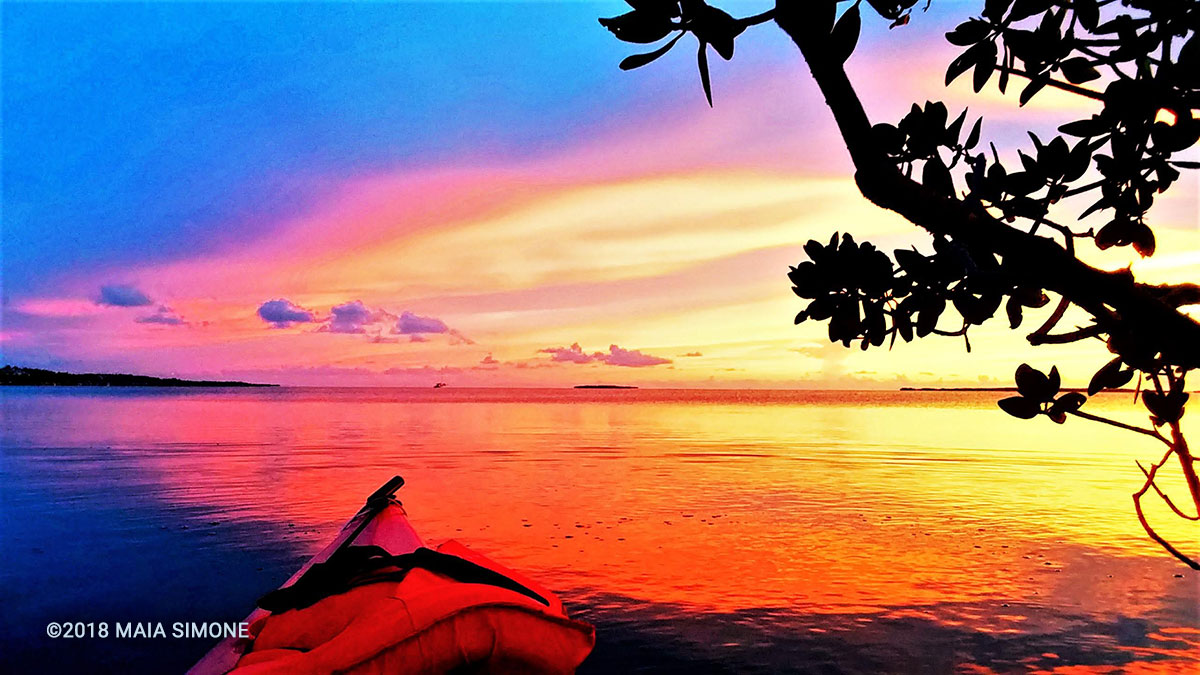
Once again, I had to wait. The sun was edging toward the last of the horizon, and the rainbows were dissipating into grayness. At last, the tide was low enough that I could paddle through without too much trouble. But I had not counted on just how low the tide would go – or perhaps, how the intense pressure of the storm would suck all the water in one direction. Suddenly I found myself grounded. I was on sharp coral rock which stretched out for maybe a mile, cratered and pale and shadowed, like the surface of the moon. I had never seen any place like this here. I had never seen anything like this in my life, really. In the distance, a sole mangrove tree grew out of nothing, standing with deep cavernous roots in the rock all alone, surrounded by puddles and framed in the sky by wisps of deep orange and red and purple and black cloud behind. It had grown a life, from absolutely nothing but hostile conditions and slim chances. In the solitude, it belonged. Light reflected in the shallow pools of water all around. I could see the patterns of water crisscross up underneath the leaves in that familiar way, but with a range of bold colors that made the tree look like an emblazoned torch facing upwards. I felt like I was trespassing in a far corner of the universe, on an alien planet. I could hear the hush of rain in the distance, and smell salt mixed with fresh new air blowing in. But alas, I could not paddle. The kayak was much too heavy to drag, and doing so would risk the coral puncturing it. I sat in the stillness and waited. Watched all the colors and sounds change around me, felt the rush of dragonfly wings rushing past my skin by the hundreds. There was peace.
In another hour, at last there was enough water to shove off again. I had one more deep stretch to cover, and again I had to pray, now that I was reentering civilization, that boats in the encroaching night would not slam into me in their hurry to dock in ports far past my own. It occurred to me that I did not have navigational lights on the boat yet, because I never paddled after sundown. It was not only a legal requirement in these hours, but an obvious safety one. If I could barely be seen during the height of daylight and calm seas, now I could not be seen at all. I took a deep breath and pushed the last of my reserves to make it across, thinking what an utter irony it would be to come this close, and drown only a mile from my house. I was leaving the boundary of the park, and reentering the noisy world I had ventured beyond, what now seemed like years ago. The rain began one last time to pound my skull, boring in like iron nails, and once again, the deep water swirled. I spun and I spun and I spun, right in the middle at the most dangerous part of the boat crossing. Come oooon! Just let me get there!
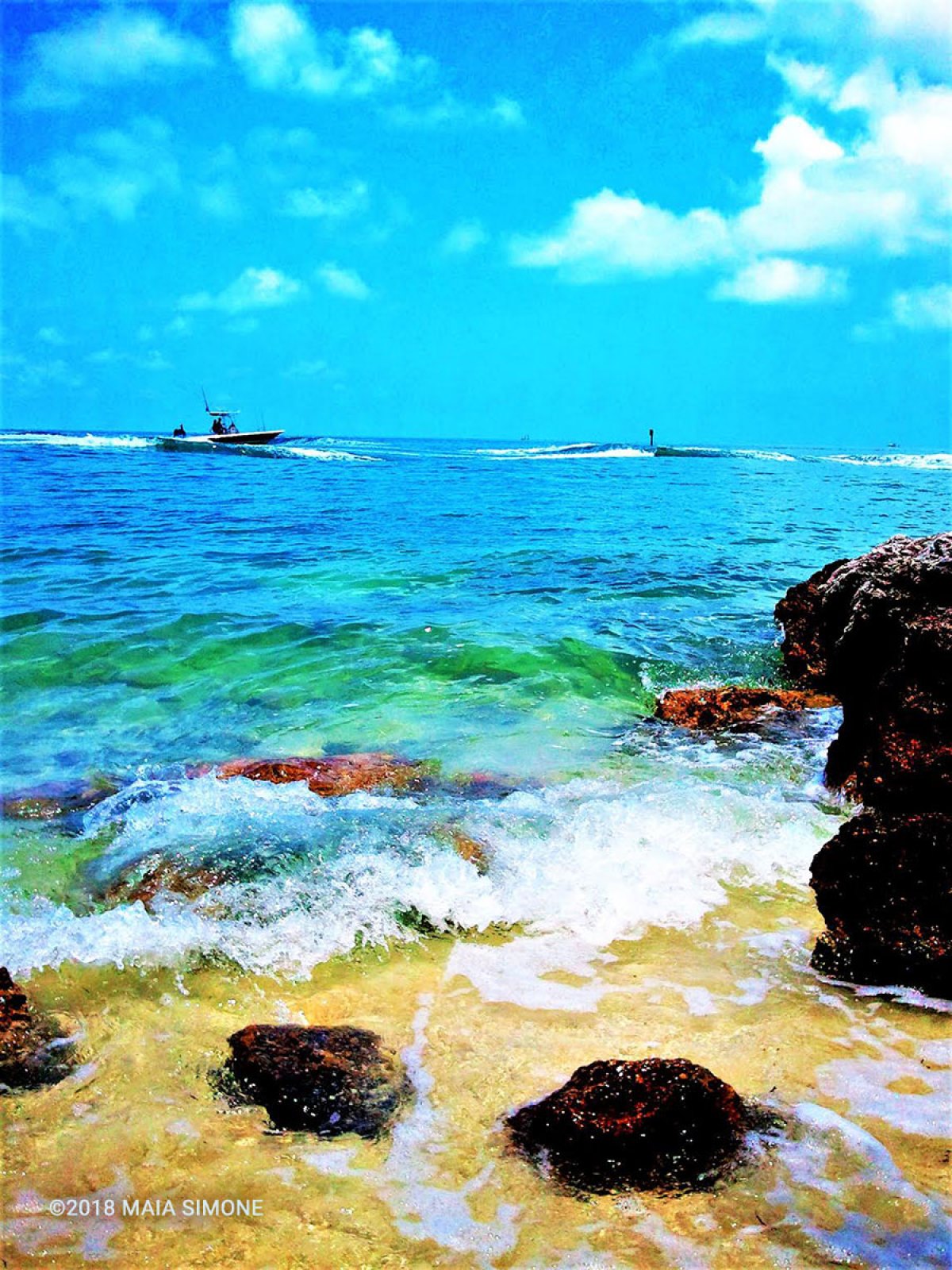
All I wanted to do was give up, to drift into the nothingness of pounding rain and sea and clouds and faraway stars, and meet my end. After all, it had to come sometime. Why not now? After all that I had come through to reach this moment, all the years of struggle and surprise and joy and sadness and confusion and displacement and identity crisis, why not just let this be my time, when at last gentle sirens’ calls carry me off into the sea? Just then, I broke through the whirlpool. The waters in front of me calmed. I could barely even lift my arms anymore, but the current pushed me toward the bay that led to my yard, and the paddling was suddenly comparatively easy. As smoothly as I had sailed out, I sailed back in again. The rain came down in soft drips. I began to see the stars in full intensity against a humid night sky. The lights wavered in the water. Stroke after stoke, one side and then the other, minute by quiet minute, I pulled in to the inlet, past the swarm of ibis and a single great white heron huddled quietly at the water’s edge, past wherever the lone crocodile was hidden in the darkness, and up to my dock.
I pulled up alongside it. Then, I laid back in confusion and bewilderment for a minute. I did not think I had the strength to pull myself up. I thought I might need to just pull the tarp up over my head – now covered in a thick blanket of mosquitoes I did not even have the wherewithal to swat away – and sleep there all night. The adrenaline that had carried me all this way, hour after endless hour, suddenly drained from my body, leaving it to fend for itself. I felt that familiar feeling, where I tell my limbs to do something and they don’t respond.
“Are you alright? Do you need me to call an ambulance? It’s a good thing you got back, there’s a tropical storm forming!” Through extremely blurry eyes, I looked up to see my neighbor pacing rather frantically back and forth on shore.
“What? No, I’m fiiiiinnnee…” I slurred. “I just… I just need to…”, I tried to pull myself up out of the kayak, and almost went head-first into the water before collapsing back down on it, nearly blacking out. My body relaxed past the point of being able to control my muscles. It knew I was safe now – no need to keep up appearance of functioning anymore.
As it turns out, my neighbor had phone in hand, and was minutes from calling the Coast Guard after me. They were not likely to have found me, and everyone would have been safer to just let me sleep out there overnight and wait for me to come back in clearer weather, so I was relieved my arrival had stopped him just in time. The last thing I want to do is draw attention to myself, and causing a community-wide search would have been thoroughly humiliating. Not to mention, the sexism that would have likely come with it, laying open the numerous flaws in my plan to scrutiny by the overabundance of mansplainers who live in these parts.
How do I explain to people who take their health for granted, how desperate I was just to enjoy it in the moment? That while I do not have a death wish by any means, nor am I patently stupid, I face mortality every day – and I would rather do it out there, than stuck here on land living the same boring day over and over again? That my life is better in the crazy, horrible experiences than it is without them, because they feel to me like JOY? I was happier in that moment of near-comatose return than I had felt in months, because that birthdaywas exhilarating! I mean, who gets a day like that?
I had no ability to articulate any of these thoughts, as it turns out. My face drooped, my muscles not even able to give away the big smile I had on the inside.My neighbor helped drag me out, and he walked me slowly up to my steps. I pulled myself backwards on my butt slowly up one step after the other, because I was too exhausted and dizzy to stand safely. He’s seen me do this before when I’m really sick, and knows not to interfere. “You sure you’ll be alright? I’ve got to call my buddies back and let them know you’re safe – there are guys all up and down the coast watching for you to come in, but nobody could see you. The storm is too bad.”
“I’m fine. No need to make such a big deal! It was just a little kayak trip. No biggie. Can’t wait to go again!” I slurred, finally reaching the top of the stairs, and using the last of my strength not to fall back down again.
“But thanks, man.”
I spent the next month in bed, covered in bruises, and remember nothing thereafter. But I have a record of texts every few days from my neighbor, asking if I needed anything. And of me texting back, “No thanks, I’m good. Hope you’re having fun!”
I don’t know where I belong in this world. But maybe I am not nearly as alone as I think.
I’m planning another trip out to Shell Island as soon as I am well enough, this time for a round of photography with my good camera. On my pack list for the next adventure are navigational lights, extra ice packs, and a better compass. I already bought the marine radio. It’s sitting in my yellow dive bag, ready to go.
edited by carmen.





Oh god.. if I wrote everything I wanted to in response to this, it would be as long as your piece.. I too have an incurable auto-immune condition and despite living in a small city, the loneliness is killing me.. I also lost my job and my so-called friends. It’s not even people that I miss so much as my own ability to.. be without them? Like before, if I felt bad I used to walk for miles ( often 25 miles) and now I have days where I can’t even brush my teeth so I can’t escape the grief for myself. It’s not even a grief I can deal with because it’s constant.. and it’s SO hard to articulate. I considered writing something for this series but just didn’t have the energy and yours is like a.. parallel version. I’ve kept vaguely together through photography, it can expand TINY spaces into HUUUUUUGE ones. My cameras in repairs atm and I can’t explain to people that it’s like losing a lover. I miss the comforting weight of it at my side, even on a day when we can’t work together ( trust me, it tests me as much as I test it!) So yeah, scuse my essay response lol, and thank you and not all at the same time ( I think you’ll understand) and now I’m gonna go away and cry with some horrible recognition/pain/empathy/response thing…
Rachel, your comment breaks my heart! (And I would never fault someone for writing more, lol! In truth, I wish everyone on Earth would write until there is nothing left to say. Words still have meaning for so many of us.) It’s funny, I kind of didn’t think about sick people reading this. I just needed to write it, because I am learning to cope and to find joy, and to get back who I used to be – but in a new way. I think actually I am becoming a better person because I got sick. It helped me focus on living my life according to my own priorities. It helped me learn to spot the users and the time wasters faster, and to be more willing to put my own needs first. I used to be a big walker too! I love what you say about photography expanding tiny spaces. I agree, my camera is my friend. When I have no one else to show the beautiful things around me, my camera sees it at least. I really hope you find ways to heal, and to know that you are not alone – even when you are lonely. You still have a lot of wonderful things to contribute in the world, and your comment is just one of those. Your voice means something to other people. And even if you’re stuck in bed a lot of times, or sometimes have to take a minute to cry because the pain is too much, you can still have an impact. Thank you for taking time out of a hard day to share such a nice thought with me. Even sharing your pain, can really help other people deal with theirs.
Thank you! *sobs pathetically*
Words can’t express how much I love this!
Aw, thank you, Amidola!
Maia, both the writing and the photos are beautiful. Thank you.
Thank you, Iarrann mé. I hope you’re having a wonderful day!
This is an amazing read. Almost like a movie plot the way you told the story with vivid enough imagery that would make me like to visit this area. I take for your better camera you have a hardshell waterproof housing? I looked in the plastic bags for myself, but the forums online said they are good for pools and lakes not the ocean.
Wow, that’s quite a compliment – thank you! Would be a fun movie to make. :) I was really hoping people would want to visit the area, and to do so in a way that is respectful of the sensitive environment here. Responsible and knowledgeable ecotours are a great thing. My better camera has far higher resolution, plus long range and macro lenses, and waterproofing. And I have some lighting and tripod/stick equipment I would bring, which is especially useful for underwater. It’s a lot of bulky stuff to carry. Yeah, the plastic bag stuff is junk for these kind of conditions, and is too great a risk for expensive equipment. I only take my good stuff when I feel strong, and have already scouted an area first. I can’t afford to replace it if I have a mishap, like what happened on this trip. That stuff would have smashed to pieces. I have a cheaper underwater camera though that is pretty sturdy, that I have protected with foam and floats so it’s hard to break or lose, which I used for a few of the shots above. It’s easily portable on trips to new destinations. But it has a bit of a fish lens that takes poor shots above water, so I have to bring 2 different cameras with me when I go on these outings as it is. It’s a pain, when you’re also trying to use your hands to paddle and keep the boat steady, and dodge angry birds at the same time.
I know what you mean. I’ve done kayaking while having my camera(non-waterproof Panasonic) in a hard case, which came with a waterproof wrist and neck strap. Do you happen to know how far the islands are from you or how many there are?
Hey Al, I’m bummed that I did not remember to include this info in the original article, but the Everglades cover about 2,000 square miles, with thousands of individual islands within that space. It borders the Gulf of Mexico, so after that, it’s just ocean. It’s very easy to get lost if you go deep inside the park or don’t have GPS and an experienced guide. I was only on the edge of the park, where the ocean water is still turquoise. But you could kayak for a hundred miles and still stay in the tropical part of it, with islands and water that all look pretty much the same. Note, these islands are made of mangroves, and are not the type you can stand on – and in the park they are protected anyway so you’re not supposed to get too close to them.
Thank you for your reply.
I am sitting here trying to digest everything in here. This was so amazing and I sat here tense with my mouth hanging open half the time.
And all I can really say is that I am in awe of your bravery. Thank you so so much for sharing this.
Thank you, Nichole – I hope I didn’t cause you too much stress! I have had a lot of crazy life-and-death adventures, both before and after getting sick. Each one is of course stressful in the moment, but brings me closer ultimately to the world around me, and to the person I want to be in it. If I could write about each of these experiences, and have people get something meaningful for themselves from it… well that would be the dream.
I definitely look forward to reading more Maia.
As a chronically sick person (though my condition is not life-threatening, which I recognize makes a big difference) trying to figure out how to explore outdoors and care for my body and not have those two things contradict each other, I really appreciated this essay.
Also, the writing and photos here are both stunning.
Thank you, Lee! I’m really glad I could speak a little bit for people who are not usually included when we talk about outdoor adventures. The way I live is maybe not the safest, but it feels very worth it to me. And I find that having some physical limitations, the more often you do something, the easier it is. So starting very small, and working out from there until it becomes more routine and no big deal. Building muscle in as much as you are able, and getting used to packing for everything that you need, makes a big difference in ability to cover ground, and to really enjoy being out there!
This was enthralling and the photos are incredible!
Thanks, AJ, I’m so glad you liked it! My original submission actually had 50 photos, lol, so there is much more to see here! But that would have just been too unwieldy for this space, given how long the piece already is. Perhaps one day I will write something else, and include some more. Photography is one of the ways that I earn enough to keep my adventures going. And it helps me remember where I’ve been! :)
Maia – I am at a loss for words at this piece…riveting, heartbreaking, galvanizing. I am a Florida native who found healing elsewhere but I’m so glad you’ve found healing in the place I call home.
Your words and photos were so evocative and gorgeous. It’s really hard to capture “true” Florida without succumbing to stereotypes and you absolutely nailed it.
I don’t get home often but if you’re up for it I’d love to connect the next time I’m in state.
In the meantime all the best to you and your impressive gear!
Ugh this was meant to be a standalone comment but I suck at the internet. I would also love to see the photos that didn’t make the article!
Excellent writing and stunning photos. If you are interested, I’d like to be your penpal.
This was incredible, thank you so much!
this piece made me fall in love with my home all over again, reigniting my desire to experience as much of my home environment as possible in all its beauty. thank you. the beauty.
Incredible writing! I’m glad you lived to tell the tale
This is going to stay with me for years. Thank you so much.
i wish I could tell you how much it meant to me to read this. I made an account just to say so. I am a native of Florida, from way down south where the coast and the everglades are basically equidistant from where I lived. I loved the way you wrote my home, and I relate a lot to your struggles as a chronically ill person although my health issues have never been quite so suffocating. I dream of living where you are and just being with the land, I hope it’s okay to say. I hope you write more for autostraddle, and I would also love seeing the rest of your photos that were originally meant to be with this piece
I am late to the party on this, but I hope you will see my comment anyway. AMAZING piece! I don’t usually go for longer form pieces, but I could not stop reading this. As a So Flo native, you absolutely nailed the imagery and made me long for the simpler times of experiencing all the natural beauty of my childhood. It’s the good stuff about Florida that no one ever talks about. I too have had brushes with nature that put one in unforeseen circumstances and create an aloneness that is hard to fully communicate. You really did a fantastic job. Thank you for sharing this harrowing & beautiful story. May your health improve. And please do keep writing & sharing your photos.
Great post.
https://www.kinemasterforpcdownload.com/
This was beautiful and enthralling.
When your legs don’t work like they used to before and I can’t sweep you off of your feet, will your mouth still remember the taste of my love? Will your eyes still smile from your cheeks?
https://shell-shockers.co
https://gamesfor-girls.com
Thanks for sharing
https://mobisoftinfotech.com/services/team-augmentation-service
Thanks for sharing this!
Its soo amazing and wonderful, i love it.
Manage LTE, Network, LAN, Wi-Fi, Storage, User Management, Firmware Upgrade, Apps Management, WPS and advance settings. jiofi.local.html Login
Playit is the best online video player application
Manage LTE, Network, LAN, Wi-Fi, Storage, User Management, Firmware Upgrade, Apps Management, WPS and advance settings. jiofi.local.html Login
https://www.jiofilocalhtmllogin.in/
https://www.playitplayerforpcdownload.com/
https://www.19216811rounterlogin.com
https://www.ashikasoni.com/
Amazing information providing by your article, thank you so much for taking the time to share a wonderful article.
Great post, thank you for sharing with us.
I have seen a lot of beautiful pictures posted in this article, it is really impressive and I definitely love it!
https://wordlewordle.org/duotrigordle
Any visitor will initially notice the Front Door. Our custom doors ignite your creativity, ship for free, and provide a wonderful world of possibilities for your remodel. You and your house are something to be proud of, therefore turn those heads and grab those eyeballs. Absolutely stunning a door! High-quality wood and lovely glass from Flanders. adds a tonne of light while maintaining privacy because to the glass’s texture. Our entire neighbour has finished it. highly advisable.